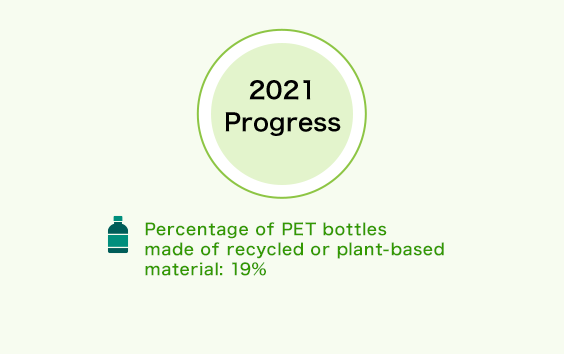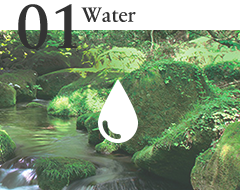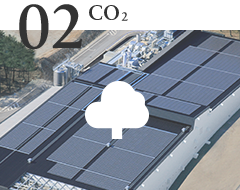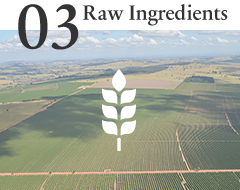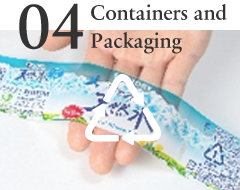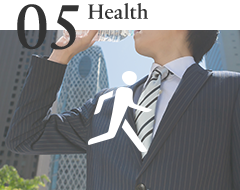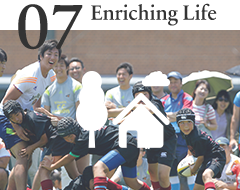We consider the environment throughout the product life cycle-from product design, packaging materials, and containers, to transportation and recycling after consumption-and work to achieve a circular economy.
Social Awareness
Toward making all plastic bottles used in the Group to be sustainable by 2030
Plastic products have enriched our lives due to their usefulness. However, environmental pollution caused by improper handling of used plastics has become a major social issue. In Japan, the Ministry of the Environment has established the Plastics Material Cycle Strategy as a strategy for comprehensively promoting resource recycling while recognizing the convenience of plastic products.
The Suntory Group is united in addressing the issue of plastics, formulating the Suntory Group Plastic Policy which view it as an urgent issue that we should take the initiative in dealing with.
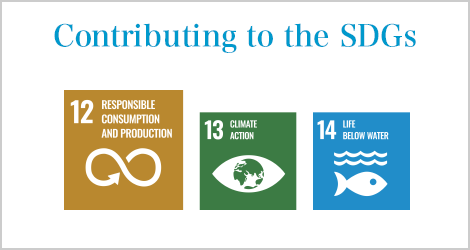
Our Approach
Reducing environmental impact from containers and packaging through our unique 2R+B*1 Strategy
Suntory Group recognizes the social and environmental impacts that containers and packaging cause and established "Guidelines for the Environmental Design of Containers and Packaging" in 1997. In regard to plastic bottles specifically, based on our unique 2R+B (Reduce/Recycle + Bio) strategy, we are working to reduce the weight of the containers, recycle them, and actively using plant-derived resins. We have created the lightest bottle cap produced in Japan*2, the thinnest bottle label (consisting of 80% reused PET resin), and the lightest domestic PET bottle (consisting of 30% plant-based material)*3.
We aim to switch all the PET bottles used for Suntory products to be made of recycled or plant-based material by 2030, achieving zero use of virgin petroleum-based materials, contributing to the realization of a recycling-oriented and zero carbon society.
- 1 "2R+B" is a registered trademark.
- 2 Designed for plastic bottles with 30 mm diameter necks. As of April 2020
- 3 Plastic bottles for mineral water (500 mL to 600 mL) in Japan. As of April 2020
Suntory Group Plastic Policy
Expressing gratitude toward the Blessings of Nature that are the source of Suntory's products, the Suntory Group will provide strong leadership for transforming into a recycling-oriented and zero carbon society to bring about a world where diverse animal and plant life shines and resonates. With its diversity in usage and convenience, plastic has made our lives easier. The plastic containers and packaging we use serve a useful function, but to prevent them from having a negative impact on the global environment, we will promote problem-solving efforts together with various stakeholders. Each employee of Suntory will work on taking responsible action to solve problems and take the initiative in bringing about a sustainable society.
-
1.Recycle & Renewable:
- Aim to switch all the PET bottles used globally for Suntory products to be made of recycled or plant-based material by 2030, achieving zero use of virgin petroleum-based materials.
- Actively work and collaborate with government agencies, industry, environmental non-governmental and non-profit organizations for the measures necessary to develop an efficient recycling system based on the situation of each country where we do business.
-
2.Reduce & Replacement:
Reduce the amount of plastic used by changing the design of containers and packaging and look for the introduction of alternative containers that do not negatively impact the environment in order to effectively utilize resources.
-
3.Innovation:
Actively invest in innovation for materials and processes that improve the recycling rate and minimize environmental impact.
-
4.New Behavior:
Promote activities that drive change in consumer behavior. Each Suntory employee will work to change their lifestyle, promote sorting and collection, and actively participate in social contribution activities such as cleaning up rivers and beaches.
Our Initiatives
Promoting Bottle-to-Bottle Direct Recycling
Suntory Group’s aims to switch all the PET bottles used globally for Suntory products to be made of recycled or plant-based material by 2030, achieving zero use of virgin petroleum-based materials.
For Suntory Beverage and Food business in Japan, the percentage of sustainable materials (recycled or plant-derived) used in PET bottles will account for 46% of the total weight of all PET bottles in 2022.
In 2023, we aim to use sustainable materials in more than 50% of all PET bottles in weight by continuing to actively promote “bottle-to-bottle” direct recycling, as well as the use of plant-derived materials.
Suntory Beverage & Food Europe brand Ribena was the first soft drinks brand in the UK to use a 100% PET bottle made from recycled plastic. The company has been increasing its use of recycled plastic - in 2021 this included the introduction of 100% recycled PET in May Tea and Pulco in France.
In 2022, Suntory Beverage & Food Europe has started 100% recycled PET bottles in its Lucozade Sport brand in the UK and Ireland.
Suntory Beverage & Food Asia Pacific, with its main operations in Vietnam, Thailand and Indonesia, is also strengthening its efforts on recycling and has introduced the company's first 100% recycled PET bottles in Vietnam in 2022.
In the wine business in Japan, we have also achieved 100% recycled 720ml PET bottles. We will continue to accelerate our efforts throughout the Suntory Group.
F-to-P direct recycling technology
We worked with Kyoei Sangyo Co., Ltd. SIPA in Italy and EREMA in Austria to be the first to succeed in developing a recycling technology that can directly manufacture preforms after processing crushed and cleaned flake from recycled PET bottles. The F-to-P direct recycling technology can reduce CO2 emissions by 70%*1 compared to virgin PET bottles. ( Current mechanical recycle can reduce CO2 emissions by 60%*1.)This F-to-P direct recycling technology received the WorldStar Award at WorldStar Packaging Awards 2019.
The recycled PET bottles produced by mechanical recycling will be colored and they have no quality issues and safety issues. The mechanical recycling system have highest cost efficiency and lowest environmental impact*2 (CO2 emissions from raw material procurement to preform manufacturing) among PET bottle recycling systems adopted in Japan in 2022.
- 1 Processes from used PET bottles to the preform production.
- 2 Based on our research
Establishment of R Plus Japan Ltd.
Suntory Group and Anellotech, Inc., a biochemical venture firm in the United States, have worked in a collaborative development of a plastic bottle that uses 100% plant-derived raw materials. Through this development, we were able to discover new possibilities for developing an efficient recycling technology for used plastics with low environmental impact. This technology is one of the most unique, ground-breaking technologies in the world, which can be expected to recycle plastics with less CO2 emissions and energy consumption than ever before. Aiming for the actual utilization of this technology, 12 companies*3 (including Suntory) within the plastics supply chain established R Plus Japan Ltd., a joint venture company focused on the recycling of used plastics. 40 companies (as of the end of May 2022), including overseas partners and companies across industries, are collaborating to take on the challenge of realizing a recycling-oriented society together.
- 3 TOYOBO Co. Ltd., Rengo Co. Ltd., Toyo Seikan Group Holdings Ltd., J&T Recycling Corporation, Asahi Group Holdings Ltd., Iwatani Corporation, Dai Nippon Printing Co. Ltd., Toppan Printing Co. Ltd., Fuji Seal International Inc., Hokkaican Co. Ltd., and Yoshino Kogyosho Co. Ltd.
Goals and AchievementsTargets & Progress

